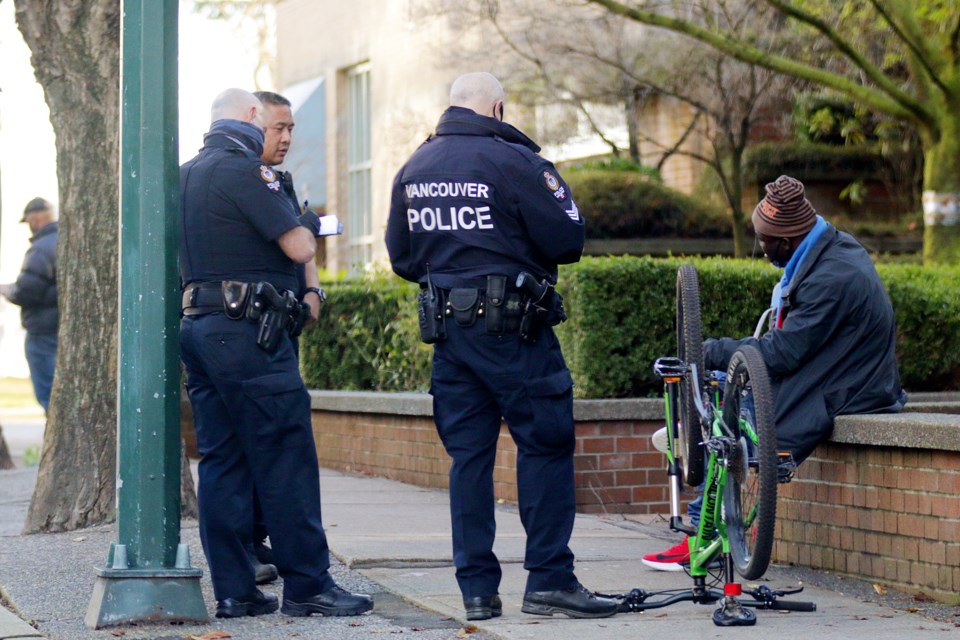David Loukidelis will focus on the police board’s role in the study conducted by Pyxis Consulting Group Inc., whose final report released in February did not include the allegations that occurred during ride-alongs with two officers.
The selection of Loukidelis was announced in a Dec. 15 letter from Brenda Butterworth-Carr, the province’s director of police services, to Police Chief Adam Palmer and Mayor Kennedy Stewart, who doubles as chairperson of the police board.
“I ask that the Vancouver Police Board and the Vancouver Police Department each identify a contact person to assist Mr. Loukidelis in accessing the information needed to carry out the review,” said Butterworth-Carr in the letter obtained by Glacier Media.
The police board ordered the Pyxis study last fall after the B.C. Civil Liberties Association and the Union of B.C. Indian Chiefs accused the department of discrimination based on police data that showed an overrepresentation of Indigenous and Black people checked between 2008 and 2017.
Since that complaint, both organizations learned from Police Complaint Commissioner Clayton Pecknold in a June 5 letter that allegations concerning two officers’ behaviour during ride-alongs with study researchers was included in a draft report, but deleted from the public report.
'Considerable anger issues'
Glacier Media obtained the draft report in July via a Freedom of Information and Protection of Privacy Act request. The report did not name the officers, and some of the section related to the allegations was redacted.
“On one ride-along…one of the officers made a number of inappropriate, racially insensitive comments to the researcher and his partner throughout the shift,” the report said.
“These comments were extremely inappropriate and highly concerning. An officer on another ride-along also made a number of inappropriate comments about vulnerable and marginalized people, and appeared to have considerable anger issues. When interacting with members of the public, he was overly terse and, on one occasion, extremely rude.”
Added the report: “While these officers were clear exceptions, their behaviour and attitude were highly concerning and something the VPD needs to address.”
Pecknold wrote a follow-up letter to both human rights groups stating the police investigation of the two officers hit a roadblock because of the unwillingness of Pyxis’s principals and eight researchers to answer questions or provide documentation, including field notes.
“The VPD [internal affairs] investigating officer has conducted a thorough and responsive investigation to this point canvassing all available avenues of investigation,” Pecknold wrote in a July 30 letter to the groups.
“Despite this, the investigator was unable to identify the officers who are alleged to have made the comments due primarily to the lack of cooperation by the Pyxis personnel. Additionally, their lack of cooperation has made it unclear as to when precisely the field notes were destroyed.”
Pecknold made it clear it was VPD civilian employees who flagged the comments in the draft report and reported it to the department’s executive, which led to the investigation by internal affairs.
In a series of email exchanges between the police board, its members and officers first obtained by Postmedia in November and later accessed by Glacier Media, police board executive director Stephanie Johanssen explained why the allegations were removed from the draft report, saying it was not the board or its street checks committee's decision.
"The committee was advised after the fact that Curt Griffiths [of Pyxis] had decided to remove it as it was unconfirmed outlier information and that it was one of his staff who had put it in there," Johanssen wrote.
Pyxis operated by former cop
Under the Police Act, police officers are compelled to provide statements and answer questions, but civilian witnesses to an incident are not. Pecknold made this point in his letter, saying Pyxis employees couldn’t be compelled to participate in the investigation.
However, Pecknold recommended Butterworth-Carr conduct an analysis of the findings, conclusions and methodology of Pyxis, which is owned and operated by Ruth Montgomery, a former Edmonton police superintendent.
The goal, he said, was to provide an understanding of practices employed in the retention and governance of Pyxis, along with methodologies used.
“This includes the destruction of records and the circumstances of the removal of the paragraph containing the allegations of misconduct from the original draft report,” Pecknold said. “These matters are outside of the purview of the disciplinary conduct investigation, but I will recommend be fully canvassed by the director.”
The VPD meanwhile, revised its street check policy in January to meet the B.C. government’s new guidelines and standards for all police departments regarding the practice of stopping and checking citizens.
Since the implementation of the new policy, the number of street checks in Vancouver has decreased by 90 per cent, according to a separate police report that went before the police board earlier this year.
Loukidelis’ review comes after more than two years of debate in the community and several reports — independent and within the VPD — that examined whether street checks are discriminatory towards a certain race of people.
In the VPD’s review of street checks in 2018, the report concluded it was “unrealistic and overly simplistic to expect racial and gender populations to align uniformly with crime data.”
Barj Dhahan, vice-chairperson of the police board, provided an emailed statement Wednesday in response to Loukidelis’ review.
“Independent reviews such as this deliver a valuable service to the people of Vancouver, and are an important tool in public sector accountability,” Dhahan said.
“These reviews show when appropriate steps were taken by an organization, and also provide insight on where there can be positive change. The Vancouver Police Board is fully committed to co-operating with this review in every way.”



